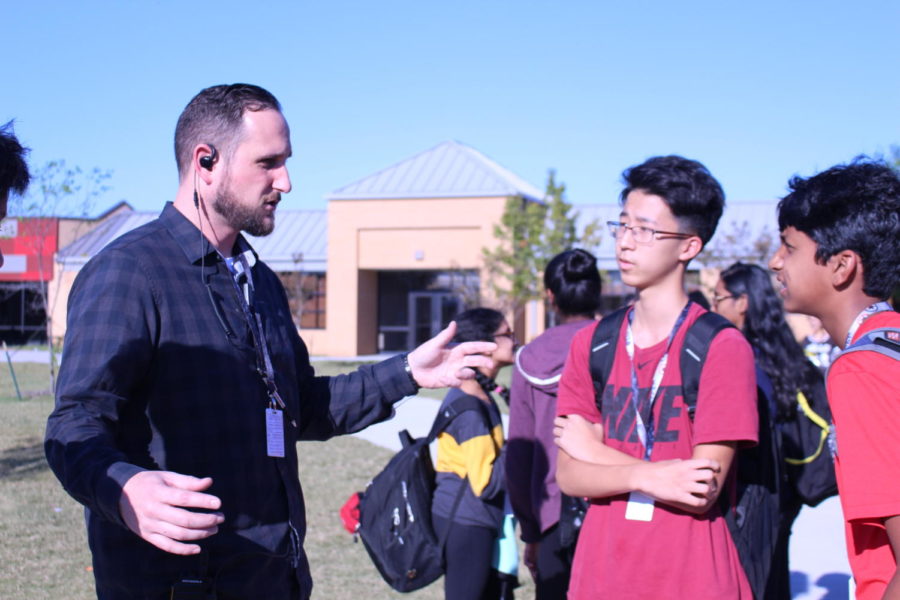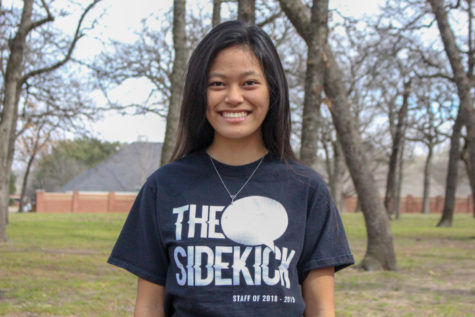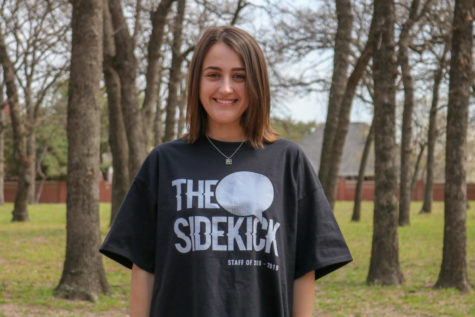Q&A: Classroom to office: Vaughn returns to Coppell as assistant principal
CHS9 assistant principal Chase Vaughn visits with freshmen Sam Ko and Pranav Swarna while on bus duty after school on Oct. 26. Vaughn has returned to Coppell ISD, and has worked at Coppell Middle School North in 2008 and Coppell High School in 2010 as a teacher and coach.
October 30, 2018
Before working at Coppell Middle School North in 2008 and Coppell High School in 2010 as a social studies teacher and coach, CHS9 administrator Chase Vaughn worked in three other districts: Lago Vista, Mesquite and Plano ISDs. He returns this year as an assistant principal at CHS9. Vaughn shares his experiences as both an educator and administrator with The Sidekick.
What brings you back to work in Coppell as an assistant principal?
It was just a great opportunity. I was an assistant principal at Plano before, and I’ve always loved Coppell. A lot of people are still here that I’ve worked with. In fact, [CISD Superintendent Brad Hunt], was actually my supervisor at the high school my first year. I know a lot of people that work in Coppell are friends of mine, and all the coaches of the high school I will talk to on a regular basis. So when I met the [CHS9 Principal Cody Koontz] and they said they had an opening, I had a chance to interview with him and hear about who he was. [CHS athletic director Joe McBride] spoke really highly of Mr. Koontz at CHS9. I was excited to interview and be back as a part of the Coppell family. I want to help build something from the ground up; after speaking with Mr. Koontz and interviewing with him and seeing his vision, I agreed with it. I’ve always loved the community and the kids of Coppell and I still talk to some of my old students from when I first taught in Coppell, so it was just a good fit.
Working in the field of education, what have you learned about the environment and those within it?
In this field, you have to love people. What’s really crazy is that the more I get into it, the more I learned that people are complicated, and nothing is ever black and white. You could have students who have struggled behaviourally for a long time in the classroom or whatever the situation is, and as an administrator, I may have gotten frustrated because they seem not to be doing what they’re supposed to. But then I get to know the kid, and when I get to talk to the kid, it’s never black and white. It’s never that the kid is just not doing what he’s supposed to. The kid is a human being, who has a story, and there may not be anything that’s necessarily wrong per se, but the kid is just complicated. You have to get to know people, you have to get inside what’s was going on with their lives, and that’s what education is all about. I guess what I’m trying to say is that there’s good in everybody – that’s what education should be.
Looking back, what advice would you give to yourself in your first year of teaching?
I would tell myself to be comfortable in the gray. Education – it’s messy because the world happens there. You have kids coming from all different cultures, from all different walks of life, from all different income levels. The teachers are the same way – and custodial staff and cafeteria staff. All these people converge in the same building with the one goal of making sure kids are successful and making sure kids are taken care of. And sometimes, things happen in a school building where it’s not black and white and gray. You have to make decisions that are ultimately for the benefit of the community and the kids. And sometimes the students are hard, and they’re not clear cut, and it’s not an easy yes or no. If I could go back and tell myself something as a first year administrator or teacher, it would be: learn to get comfortable being uncomfortable, because there’s never been a decision I’ve made as an administrator or as a teacher that was easy. And you have to be okay with that.
What are the some of the most challenging moments you’ve experienced in the school?
I would say student management can be challenging, and not because of having to discipline or anything like that. We don’t dull out discipline, and our end goal for every kid is to help. What can we do? What interventions can we put in place to help them be successful? That’s the goal of any student management. What makes it difficult are the situations. Like I said, situations are always complicated. They’re never easy situations. No matter what comes up with this kid or that kid, there’s always a story that makes whatever intervention that we need to do, you know, tough. That’s the most difficult thing. When you take the whole person into account, no matter what decisions made in terms of management at the end of the day, that’s still that’s a person and our decisions affect lives. That always comes with a heavy price.
What is the most rewarding about having worked in education?
When I was a teacher, it was all the kids’ interactions every single day. But as an administrator, what is great is that although the kids are always at the forefront, I’ve really enjoyed forging strong relationships with teachers – which I did as a teacher, but as an administrator you have a different perspective, because you’re in charge of the hiring, you’re in charge of really digging in deep and getting to know the teachers and collaborating with them. It’s just a different perspective and it’s something that I really enjoy: I love working with the teachers. Working with teachers, partnering with them and collaborating with them means the impact on kids is even greater. I get to be a part of touching that many more kids’ lives by working with teachers because they have all 150 kids apiece.
How was the transition between being a teacher and being an administrator?
Anytime you switch your job responsibilities, there’s a learning curve there. I had to learn how to be an administrator. There were things as a teacher that I didn’t have to do. I didn’t have to necessarily look at policies and procedures at a school wide level. As an administrator, you got to take a step back and look at what what’s best for the entire school. Whereas as a teacher, your scope and focus is on your classroom, and sometimes you can make decisions and do things in your classroom that may be different when you take the perspective of how it affects the entire school. So it’s just learning to adapt my perception from a classroom level to a school wide level.











